21st April 2021. On 7th April 2021 the National Green Tribunal (NGT) sat for its latest hearing in a long running court battle over pollution of the area surrounding Vedanta Ltd subsidiary Talwandi Sabo Power Limited (TSPL)’s coal fired power plant in Mansa, Punjab. Following its earlier ruling which found that highly toxic emissions and fly ash are damaging large areas of productive agriculture, the tribunal ordered TSPL to pay Rs 528.6 crores ($71 million), equating to 10% of their 2018-19 turnover, to compensate the affected farmers and the damage to the wider environment. TSPL are expected to challenge the verdict.
In his summing up Justice Adarsh Kumar Goel stated his hope that such significant compensation would be a deterrent to other would-be polluters. The NGT also recommended that the Central Pollution Control Board (CPCB) issue appropriate guidelines for remedial measures during the particularly polluting start up period of Thermal Power Plants (TPPs) and also advise the State PCBs/PCCs to incorporate suitable conditions in granting Consent To Operate (CTOs) to such TPPs. 14 Indian coal power plants including TSPL were previously identified as the worst offenders flouting environmental laws by the Central Pollution Control Board in February 2020.1

Local farmers from Raipur, Perron, and Behniwal villages have been agitating and seeking justice for the damage to their crops since TSPL was commissioned in 2013. Though this judgment represents a significant victory for their struggle they remain frustrated by the legal process which excluded them from consultation about the amount of compensation required for environmental remediation, and to cover their own loss of paddy and cotton crops. Justice Goel agreed with a previous assessment that Rs.84,99,574/- ($114,000) was owed to farmers for loss of livelihood. The remainder of the fine will be split between environmental compensation and remediation of the affected areas. Lead applicant Kulwant Singh of Behniwal village, whose land is contaminated by TSPL fugitive gas and fly ash pollution said:
“We welcome the judgment in its spirit. We have been waited so long for so little. Why should we bear the burden while the thermal plant makes money out of our plight. We would like to see justice served and the plant take proper measures.”
The NGT ruling states, as per the earlier July 15th 2020 NGT order, that:
-
Coal with ash content exceeding 34% is being used in violation of Rule 3 of the Environment (Protection) Rule, 1986.
-
Emission limits laid down vide notification dated 07.12.2015 are exceeded.
-
Flue Gas Desulphurisation (FGD) has not been installed as required under instructions of the CPCB.
The court called TSPL’s management of fly ash ‘unscientific’, and noted that vast quantities, containing highly toxic radioactive elements and heavy metals were building up in silos and spilling into the surrounding fields and communities. The report noted that TSPL was using light diesel oil as a fuel, when it was only designed for coal.2
The earlier 15th July 2020 NGT ruling, following investigation by the NGT Monitoring Committee, found that highly toxic emissions and fly ash are damaging large areas of productive agriculture, and ordered TSPL to pay the compensation amount of Rs.84,99,574/- ($114,000) to farmers (which was earlier assessed by the Sub Divisional Magistrate (SDM) for Mansa) for the damage caused to the crops. The NGT Monitoring Committee headed by former Justice of Punjab and Chandigarh High Court Justice Jasvir Singh recommended NGT to impose environmental compensation of suitable amount for restoration of the quality of environment in his report. As per para 11&12 of the Judgement, NGT formulated certain guidelines for assessment of environmental compensation on the basis of Polluter Pay Principle and directed both CPCB and Punjab State Pollution Control Board (PSPCB) to assess the environmental damage. The ruling also left open the option for both the Central and State Pollution Control Board to impose environmental compensation, equating to 10% of their 2018-19 turnover, i.e. Rs 528.6 crores ($71 million). NGT also directed the unit to deposit the amount assessed by the SDM to District Magistrate to utilise for execution of restoration work of the affected area, damaged due to the pollution caused by TSPL.
In addition Justice Jasvir Singh instructed TSPL to develop a green belt of broadleaf trees around its periphery to limit coal dust and fly ash emissions. He also instructed the PPCB to conduct a local study of air quality to assess the level of pollution generated by the plant and its impact on human health and agricultural crops. PPCB will also conduct ground water monitoring in a radius of 10 km from the ash dyke to ascertain the potential impact of pollutants leaching into groundwater.
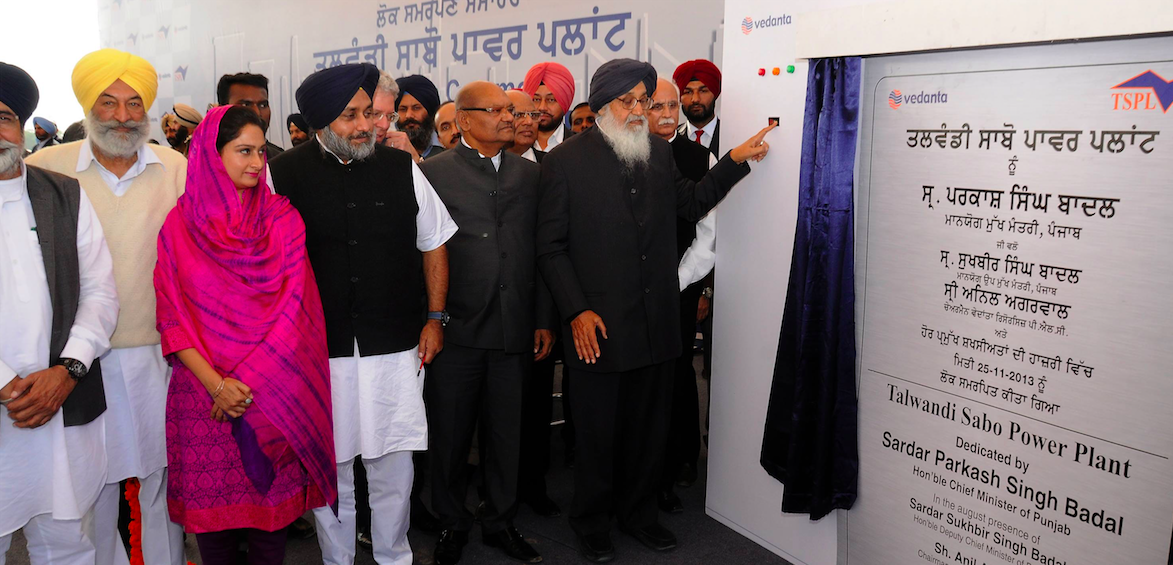
In a personal hearing before Punjab State Pollution Control Board (PSPCB) on 27 November 2018, TSPL admitted that during start up of the plant after shut down, the Air-Pollution Control Devices (such as electrostatic precipitators which remove fine particles from smoke) are bypassed until flue gas temperature reaches 110 °C to 120°C. This can continue for more than 24 hours.
TSPL conducted a study on radioactivity and heavy metal contents in their coal and fly ash from September 2018 to 2019 and admits that there is dominance of Fe, Mn, Cr & Zn in the coal and coal residue. The report concludes that the concentration of heavy metals in Indian coal are higher as compared to imported coal.
Foil Vedanta activists have been monitoring and visiting the area since August 2015 on a fact-finding mission, following the commissioning of the huge 1,980 MW plant by Vedanta Ltd in 2013.
During their first visit in 2015 they witnessed a farmers strike and protest over fly ash which rained down over their crops.3
In September 2017 TSPL was fined Rs 5 lakh for pollution following a Hindustan Times report on December 6, 2016, entitled ‘Talwandi Sabo private power plant flouts green laws to save Rs 400 crore’, which found that plant management was using coal with ash content of 48% in violation of norms. 4
In September 2018 residents of Mansa’s Raipur village took their fight over pollution of their fields and damage to their health by TSPL’s fly ash to district authorities, suspecting that radioactive elements and heavy metals in the ash could be profoundly damaging their soil and their families’ health. Investigations made by Mansa district authorities on January 24, 2019, found fly ash lying on about 965 acres of Raipur, mostly cotton and paddy crops.
Local woman Ms Sajeed Kaur tells of the impact of TSPL’s plant on their lives in this short video in Punjabi:
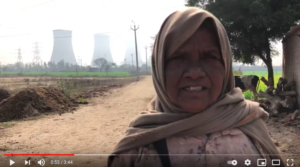
“My name is Sajeed Kaur and I’m 60 years old. There is smoke, my eyes water, there’s pain in my chest and stomach. No medicines are given to us here, we go to the market in the city, in Mansa, or Talwandi, to buy medicines. I have trouble breathing, I get breathless. There is a burning smell at night, the smell of coal. My grandson works in the plant. His leg hurts. My son has chest pain. Illnesses have increased because of the power plant, there’s constant smoke.”
In another short clip, local orange farmer, Mr. Makbal Singh from Behniwal village, paints a similar picture.
Choking on coal
TSPL is far from the only criminally polluting private power company in India, where 65% of the country’s electricity is produced by coal. In January 2021 India’s federal pollution regulator the Central Pollution Control Board (CPCB) warned 14 coal-fired plants that they could be shut down and penalised if they do not comply with environmental regulations. 11 of these (including TSPL) are located in a 300km radius of Delhi, and identified as bearing a significant responsibility for the city’s extremely high pollution levels by a 2016 report of Indian Institute of Technology. In a January 31st Letter to the general manager of the TSPL, the CPCB Chair cited a long list of alleged violations and asked TSPL to ‘show cause’ why the plant “should not be closed in view of the non-compliance and environmental compensation be imposed for continuing non-compliance of the directions”.
However, two year deadlines to comply with pollution legislation introduced by the Environment Ministry in 2015, have recently been extended again. The 1st April 2021 amendment by the Ministry of Environment and Forests splits the 14 thermal power stations into three categories. Those within a 10 kilometre radius of the National Capital Region must comply by 2022, while six others, including TSPL are given an extension till 2024 / 2025.5 Only one out of 11 power plants around Delhi is complying with legal requirements to install Flue Gas Desulphurisation equipment to reduce emissions of lung disease-causing sulphur oxides, according to the Central Electricity Authority. 6
A March 2021 report by the Centre for Research on Energy and Clean Air (CREA) found that the 11 thermal power plants within 300km of Delhi were responsible for approximately 4,830 deaths each year due to asthma, pre-term births and COPD caused by airborne pollution. The report found that the installation of emission control technologies would prevent 62% of these deaths. In 2018 alone the cost of this pollution borne by the Indian taxpayer was Rs 6,700 crore.7
The table below showing the annual emissions load from each of the 11 plants, copied from the CREA report, shows that TSPL is by far the worst polluter, with the highest levels of sulphur dioxide (SO2) and particulate matter emissions, and the second highest Nitrous Oxides (Nox) and Mercury.
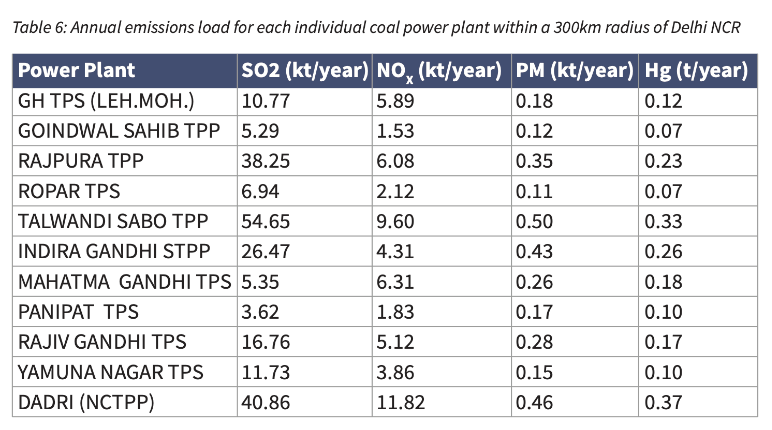
Source: Health and Economic Impacts of Unabated Coal Power Generation in Delhi- NCR, Centre for Research on Energy and Clean Air, p.15, March 2021.
Privatisation premium
TSPL was incorporated in April 2007 by Punjab State Power Corporation Limited (PSPCL) in order to create a 1,980 MW greenfield power plant in Punjab. As per the State policy of privatisation the ownership was later transferred to Vedanta Limited, following tendering adverts placed by TSPL in the UK’s Financial Times. Vedanta touted the development as the ‘greenest thermal power plant in North India’.
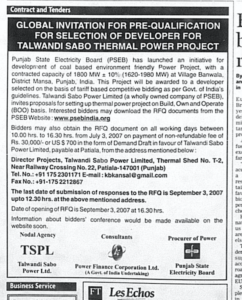
The land was acquired by the government of Punjab on the basis that it would be for its own use, and not for the benefit of a private company, which would have incurred stricter considerations. The well irrigated agricultural land was described as ‘barren’ and consequently, as farmers claim in an appeal filed before the Punjab and Haryana High Court, they were underpaid in compensation. Labour-farmer groups held mass rallies demanding fair payment for acquired land and80% reservation of jobs for local people. Movement leaders were routinely arrested and held on false cases.8 Access to common resources and other valuable assets such as tube wells, houses and trees were lost by the land grab, which adversely affected the poorer and Dalit locals. Sand dunes which previously acted as flood defences were bulldozed during the plant’s construction, resulting in an increase in flooding in the region.i
The Power Purchase Agreement (PPA) signed between TSPL and the PSPCL guarantees that the State will buy 100% of its generated power for 25 years. However, a litigation case between the Punjab government and two private power plants (TSPL and Nabha Power Ltd [NPL]) revealed in March 2020 that the PSPCL had artificially inflated the State’s power demand from 1800 MW to 3100 MW in 2007 and then by a further 2100 MW in 2008, resulting in the government being required to purchase far more energy than it requires. As a result the PSPCL was forced to pay ‘surrender charges’ of Rs 1,633 crore to NPL and Rs 2,050 crore to TSPL from 2014-15 to 2019-20 for the excess power generated. This charge was then passed on to consumers. 9
Inflaming the costs further, the power companies imported lower grade coal at a higher price than available from the PSPCL’s captive Pachhwara coal mine, resulting in another Rs 400-500 crore per annum being passed on to customers.10 India is the world’s second largest thermal coal importer behind China, sourcing coal primarily from Indonesia, South Africa and the United States.11
Another condition of Punjab’s PPAs which unfairly benefits the private companies are certain waivers of compliance with environmental laws. These conditions were exposed by a September 2020 case at the Appellate Tribunal for Electricity. The tribunal found that PSPCL would have to pay the private companies TSPL and NPL for installation of Flue Gas Desulphurisation, selective non-catalytic reduction technology (SNRC) and water treatment system as a result of the tightening of environmental laws to control emissions of nitrogen dioxide, sulphur dioxide and to reduce water consumption of power plants, costing the State an estimated Rs 3,000 crore.12
Despite the extremely beneficial terms of the privatisation of TSPL, Vedanta Ltd had used this asset to amass $814 million in debt by March 2020, making it the most indebted subsidiary contributing to the company’s current $7.7 billion debt. Meanwhile parent company Vedanta Resources currently owes $10.9 billion in loans and $4.2 billion in bonds, while owner Anil Agarwal’s investment company, Volcan Investments, which controls Vedanta Resources itself owes $425 million.13
Greenwash
In the midst of the slew of environmental litigations against TSPL, the company was heralded with an award for ‘outstanding achievement in the promotion of sustainable agriculture’ for their ‘Navi Disha’ CSR project at an online ceremony held on October 5th 2020 by Corporate Social Responsibility firm Greentech14. Greentech describe themsleves as ‘India’s leading organization dedicated to the cause of creating, recognizing and rewarding best practices in the areas of Environmental Management, Occupational Healthy and Safety, CSR and HR among India’s ever vibrant corporate world‘, and count former Chief Justice of India Dipak Misra on their board alongside a variety of oil and gas executives and academics.
Vedanta are well versed in using inflated and highly publicised CSR projects to greenwash the devastating environmental and human rights costs of their projects and there are many a dodgy agency such as Greentech ready to lend credibility to their claims. Not least the famous ‘Golden Peacock’ award, won by Vedanta for ‘excellence in corporate governance’ in 2019, shortly after Vedanta Resources’ disgraceful exit from its London listing following the 2018 massacre of 13 protesters by police at its Tamil Nadu copper plant, and previously in 200915 for excellence in environmental management of its infamous alumina refinery in Lanjigarh, Orissa.16 In 2012 an award at British Safety Council’s “Oscars of health and safety” was repealed after London Mining Network and others wrote a letter to the authority exposing their history of major accidents including the deadly Korba chimney collapse.17
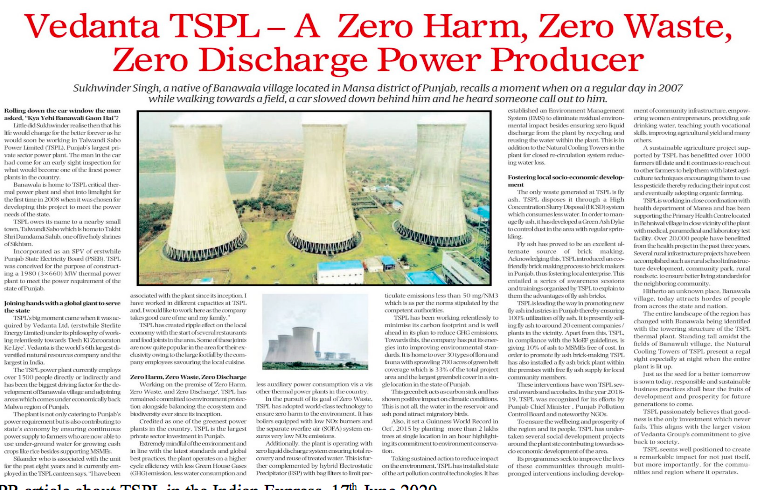
This latest judgement against Vedanta should be read as a whole. As per section 20 of the National Green Tribunal Act, 2010, the tribunal has applied the principles of sustainable development, the precautionary principle and the polluter pays principle. Under Section 15 of the NGT Act of 2010, the tribunal provides compensation to the victims of pollution. The polluter also provides compensation for damaging the environment. In addition to this, NGT may also direct the polluter to pay compensation for restitution of the environment for the affected areas. The present Judgement pronounced by the NGT against TSPL should be implemented in true letter and spirit.
Recently, the innocent farmers whose crops were severely damaged due to fly ash blowing over their land from TSPL in the year 2018, approached to Deputy Commissioner Mansa, to disburse their compensation amount as per the previous NGT judgement. But the Commissioner refused their claim saying that there was no clear direction in this regard and directing them to file a review petition before the NGT for clarification. With this latest judgment these victims of pollution are a step closer to justice which they have waited so long for, causing untold stress on their livelihood and income.
SOURCES:
1https://www.reuters.com/article/india-pollution-coal-idINKBN1ZZ2A4
2https://energy.economictimes.indiatimes.com/news/coal/ngt-seeks-report-on-environmental-damage-by-tspls-unscientific-management-of-fly-ash-in-mansa/76995948
3http://www.foilvedanta.org/news/talwandi-sabo-power-laborers-strike-for-unpaid-waged/
4https://www.hindustantimes.com/punjab/punjab-talwandi-sabo-power-plant-fined-rs-5-lakh-for-pollution/story-xVpCD1Pg2eLarcxfJD0xRO.html
5https://www.downtoearth.org.in/blog/pollution/environment-ministry-amendment-gives-coal-thermal-power-stations-full-licence-to-pollute-cse-76375
6https://www.reuters.com/article/india-pollution-coal-idINKBN1ZZ2A4
7https://www.indiatimes.com/news/india/toxic-emissions-ncr-deaths-toll-delhi-536860.html
8Samkaali Lok Morcha, March-April 2008, pp.34-36 ‘A large convention was held to organize the masses for Employment Guarantee and demands related to the Banawala Thermal Power Plant tussle.’
9https://timesofindia.indiatimes.com/india/punjab-stares-at-rs-25000-crore-burden-from-faulty-ppas/articleshow/74467118.cms
10https://timesofindia.indiatimes.com/india/punjab-stares-at-rs-25000-crore-burden-from-faulty-ppas/articleshow/74467118.cms
11https://www.reuters.com/article/india-pollution-coal-idINKBN1ZZ2A4
12 https://www.hindustantimes.com/cities/others/talwandi-sabo-thermal-plant-liable-to-pay-rs-85-lakh-to-farmers-ngt-s-state-panel-101613915836600.html
13 https://www.livemint.com/companies/news/vedanta-to-raise-8-bn-for-bpcl-bid-11608078446353.html
14https://thecsrjournal.in/vedanta-subsidiary-tspl-greentech-csr-award-sustainable-agriculture-punjab/
15 https://www.downtoearth.org.in/news/vedanta-got-a-golden-peacock-almost-3579
16 https://www.theguardian.com/business/2012/may/14/vendata-loses-safety-awards
17 https://www.theguardian.com/business/2010/aug/29/vedanta-safety-awards-stripped
i Affidavit by Harinder Singh Pal, Advocate, 2018, Not yet submitted to the court.